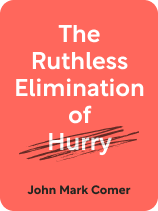

This article is an excerpt from the Shortform book guide to "The Ruthless Elimination of Hurry" by John Mark Comer. Shortform has the world's best summaries and analyses of books you should be reading.
Like this article? Sign up for a free trial here.
Why are you so busy? Why does it feel like you’re out of sync when you try to slow down?
In The Ruthless Elimination of Hurry, pastor and author John Mark Comer explores culture’s obsession with rushing. He explains how this obsession infiltrates and impacts your life and offers an antidote.
Read more to learn why you and everyone else are always in a rush.
A Culture of Busyness
Why are you so busy? Comer says that our culture values speed and that this value compels us to rush. Our culture surrounds us with messages that it’s better to be fast than slow. We internalize these messages and arrange our lives to match the speed of the world around us.
For instance, consider the popularity of apps designed to help you maximize your efficiency and productivity at work. These apps send the message that productivity and efficiency are better than working at a relaxed pace. When you download and use them, you reinforce this value and speed up the pace of your life.
| How Widespread Is the Tendency to Rush? Comer says that everyone is surrounded by messages that speed is better, internalizes these messages, and designs their lives to prioritize speed. However, Comer doesn’t explore counterexamples that suggest the pace of life and its associated values aren’t universal. Although a fast-paced lifestyle may be prevalent in some places, some people have historically valued a slow pace of life and continue to do so. For instance, barakah culture is an Islamic lifestyle that values slowing down and simplifying your life, allowing you to focus on worshiping Allah and connecting with those around you. Furthermore, some people are resisting the obsession with rushing that Comer discusses. In his book In Praise of Slowness, Carl Honoré calls this worldwide effort to slow down life the “Slow Movement” and explores examples throughout the world. For instance: • The Society for the Deceleration of Time, whose members hail from across Europe, publishes essays on the merits of being slow, engages in performative art that celebrates slowness, and holds conferences to discuss ways to slow down life. • In the late 1980s, Italian culinary writer Carlo Petrini founded the International Slow Food Movement, a group that encourages the leisurely eating of slow-grown foods. Today, the movement has more than 78,000 members. |
Comer identifies a belief that contributes to maintaining the pervasive culture of speed: the delusion that we can do everything we want. Comer calls this a delusion because, in reality, we don’t have enough time to do it all. For instance, you may believe you can be an effective worker, a loving family member, a talented athlete, a hilarious TikToker, and a supportive friend—but in trying, you’ll sacrifice your sleep and health, making it impossible to meet all these goals.
| Our Delusions About Time Another delusion may contribute to perpetuating this culture of speed: the delusion that we can fully control how we use our time. In Four Thousand Weeks, Oliver Burkeman explores why we have this delusion and why it’s false. Burkeman says that the Industrial Revolution’s focus on maximizing productivity has led us to believe that time is a resource we must use well by being ultra-productive. He adds that time-saving technologies (like dishwashers) make us think we can save time in other areas of our lives, such as our commute to work. But, Burkeman says that we have less control over how we use our time than we think. First, our automatic habits get in the way: For instance, we tend to work on minor tasks to distract ourselves from important tasks. Second, it’s hard to prevent other people from dictating how we use our time. Any time we’re efficient in our work, people expect us to be even more efficient in the future. This reduces our autonomy over our time. |
What It Means to Rush Through Life
According to Comer, busyness can be either negative or positive. He draws a distinction between what we’ll call a lively lifestyle (positive busyness) and a rushed lifestyle (negative busyness):
- When your life is lively, it brims with meaningful experiences. Comer presents four criteria that characterize meaningful experiences: They 1) nurture your spirituality, 2) deepen your relationships, 3) support your health, and 4) cultivate your sense of purpose.
- When your life is rushed, it’s packed with meaningless experiences—time-consuming tasks that distract you from meaningful experiences.
(Shortform note: Busyness may have additional benefits beyond those Comer explores: Specifically, busyness may improve cognition and increase self-control. One study found that busy people tend to score higher on cognitive tasks, such as tasks related to memory, compared to people who are less busy. Another study found that reminding people about their busy lifestyle increases the likelihood that they’ll make decisions that benefit them in the long run, such as decisions related to exercise and saving for retirement. This suggests that busy people tend to delay gratification in favor of making healthy choices.)
| Additional Advice on Identifying Meaningful Experiences Comer doesn’t explore in depth how to tell whether an experience meets the four criteria of meaningful experiences, which may make it hard to evaluate to what extent your life is lively versus rushed. Let’s explore other experts’ perspectives on these criteria. What it looks like to nurture your spirituality: Nurturing spirituality may look different for different people. Some Christian thinkers say the best way to nurture your spirituality is to regularly attend church, explaining that gathering weekly with other worshippers inspires you and holds you accountable for making time for God. However, others say Church attendance isn’t required for nurturing Christian spirituality. For instance, in How to Be a Christian Without Going to Church, pastor Kelly Bean insists that you can nurture your spirituality in other ways, such as gathering regularly with fellow worshippers online or offline to discuss God’s word and organize service projects. However, these two perspectives share the belief that nurturing your spirituality means regularly spending time with God. What deep relationships look like: Simply spending time with loved ones may not be enough to maintain deep relationships. Psychiatrist Amir Levine and psychologist Rachel Heller argue in Attached that different people have different “attachment styles,” or ways of meeting their relationship needs. For instance, avoidant attachers may appreciate long periods of alone time, whereas anxious attachers may wish to spend quality time with you every day. If you’re aware of your loved ones’ attachment styles and tailor your interactions with them accordingly, your relationships are likely to be deep and meaningful. What it looks like to support your health: Many medical experts believe that your physical and mental health are closely linked, so supporting your overall health requires attending to both your physical and mental well-being. You can support your mental and physical health through habits such as eating a healthy diet, exercising, getting enough sleep, and avoiding unhealthy behaviors like smoking. How to tell if experiences cultivate your sense of purpose: In Wanting, Luke Burgis says that an experience is likely to be meaningful, and therefore to contribute to your sense of purpose, if you answer “yes” to these three questions about it: • Will it improve others’ lives? For example, you may derive a sense of purpose from becoming an art therapist who helps people heal through creativity. • Will it provide long-term satisfaction? For instance, a degree in philosophy may equip you with lenses to approach the rest of your life with curiosity. • When you’re on your deathbed, will you be glad you pursued that experience? People close to death often regret having chased meaningless experiences over meaningful ones that would have contributed to their sense of purpose. |

———End of Preview———
Like what you just read? Read the rest of the world's best book summary and analysis of John Mark Comer's "The Ruthless Elimination of Hurry" at Shortform.
Here's what you'll find in our full The Ruthless Elimination of Hurry summary:
- Our cultural obsession with rushing and how it's harmful in many ways
- How to stop rushing by deepening your Christian spiritual practice
- How to carve out more time for your spiritual practice






